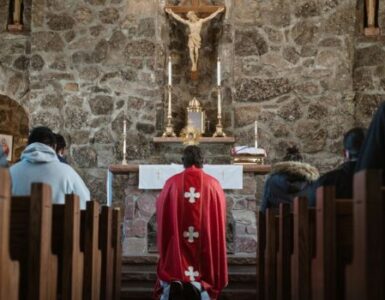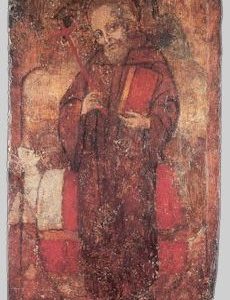St. Tarasius lived in the Byzantine Empire during the eighth century. At first he was secretary to the Emperor Constantine and Constantine’s mother, Irene.
Later when Paul IV, Patriarch of Constantinople, died, an assembly was held to discuss his replacement. The people, who had come to know Tarasius from his defense of venerating sacred images, wanted Tarasius to be their new Patriarch. Tarasius gave a speech proclaiming himself unworthy of such an office, saying it would not be right for a layman such as he to hold this position. He stated he would only take the office of Patriarch on the condition that a General Council be summoned to resolve disputes between Constantinople and the Catholics of Western Europe. The Council was held in the Church of the Holy Apostles at Constantinople in the year 786. A year later it reconvened at Nice and the pope approved the decrees.
Tarasius witnessed the death of Constantine, who was not fond of Tarasius because of his refusal to sanction the emperor’s divorce. Tarasius lived through the reign of Constantine’s mother, Irene, and the overthrow of Nicephorus.
Tarasius was a prayerful man who spent his episcopacy trying to reform his clergy and the people. During his twenty-one years as Archbishop of Constantinople, he personally visited the poor and sick in hospitals to assure that they were receiving adequate care. He was truly a shepherd to his flock. St. Tarasius died in 806.
Lessons
During his lifetime Tarasius made many enemies. Constantine was unhappy with him because he refused to sanction his divorce or to marry him to another. Even though he did this there were others who were displeased that he didn’t do more, so he felt both the emperor’s displeasure as well as the displeasure of the emperor’s enemies. He was falsely accused of tolerating and allowing simony (the buying or selling of spiritual things). He defended himself against these charges and wrote a synodal letter to counter such practices.
Later Tarasius crowned emperor Nicephorus who had overthrown Irene and this greatly upset the populace. It was evident that Tarasius did not live his life to please men but to serve his Master in heaven.
Prayer
Saint Tarasius, we pray that we might have the strength and humility to live our lives for our Creator and not for the praise of men. Intercede for us, dear saint, that we might obtain the grace to live such humble lives. Amen.
Other Saints We Remember Today
St. Matthias (1st Century), Apostle, Martyr, replaced Judas
St. Walburga (779), Abbess
St. Ethelbert (616), the first Christian English King










